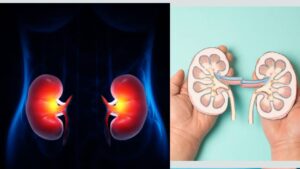Our kidneys are some of the hardest working organs in the body. Each kidney works 24/7 to filter blood, remove waste, maintain fluid balance, regulate blood pressure, and maintain overall health. Yet many people don’t realize how easily kidneys can become damaged – often without any symptoms until the problem becomes serious. Understanding why kidney damage occurs is the first step toward protecting these essential organs.

In this article, we’ll explore the common causes of kidney damage.
What do kidneys actually do?
Before we learn about kidney damage, let’s learn about the functions of the kidneys for us.
Filters toxins and waste products from the blood.
Maintains a balanced level of salt, potassium, and minerals
Controls blood pressure.
Produces hormones that support healthy red blood cells and strong bones.
Maintains the body’s water balance.
Since they do so many jobs, even minor kidney problems can affect the entire body.
Main causes of kidney damage:
1. High blood pressure:
High blood pressure is one of the leading causes of kidney damage worldwide. When blood pressure is too high, it puts extra pressure on the delicate blood vessels inside the kidneys. Over time, these blood vessels weaken and cannot filter blood properly.
Many people do not experience symptoms of high blood pressure until the kidneys are damaged.
Diabetes: (High blood sugar)
Another major cause of chronic kidney disease is diabetes. When blood sugar levels remain too high for a long time, it damages the small blood vessels in the kidneys. This condition is called diabetic nephropathy.
Uncontrolled diabetes gradually reduces kidney function and eventually leads to kidney failure, making early diagnosis and blood sugar control essential.
Overuse of painkillers and certain medications:
Many common medications especially over-the-counter painkillers can damage the kidneys if taken too much or in high doses. These include:
Ibuprofen
Naproxen
Aspirin (overuse)
Some antibiotics
Some herbal supplements
These medications reduce blood flow to the kidneys, causing gradual damage. Painkillers are safe when used responsibly in recommended amounts, but regular long-term use should always be investigated by a doctor.

Dehydration and low water intake:
Water is essential for healthy kidneys. When the body doesn’t get enough fluids:
The blood thickens.
The kidneys have to work harder.
Waste materials build up.
Kidney stones can form.
Chronic dehydration can weaken kidney function over time. Drinking enough clean water every day is one of the easiest ways to protect your kidneys.
Smoking and alcohol consumption:
Smoking reduces blood flow to the kidneys and increases the risk of high blood pressure, both of which damage kidney tissue.
Excessive alcohol consumption dehydrates the body and puts strain on the kidneys’ filtration system. Long-term alcohol consumption can seriously reduce kidney function.
Kidney Infection:
A common urinary tract infection (UTI), if ignored, can travel to the kidneys and cause serious damage. Kidney infections can cause swelling, scarring, and long-term health problems if not treated quickly.
Symptoms may include back pain, fever, or a burning sensation when urinating, but some infections are silent, especially in older adults.
Genetic problems:
Sometimes, kidney damage is caused by conditions that run in families or diseases where the immune system mistakenly attacks healthy kidney cells. Examples include:
Polycystic kidney disease
Lupus nephritis
Glomerulonephritis
These conditions often require lifelong medical care.
Early Signs of Kidney Damage:
Kidney problems are often called “silent diseases” because they develop slowly and only show symptoms in the later stages. Some early signs include:
*Swelling of the feet, ankles, or face.
*Persistent fatigue or weakness.
*Foamy or bubbly urine.
*Frequent urination at night.
*Difficulty concentrating.
*Loss of appetite.
*Dry, itchy skin.
*High blood pressure.
If you notice more than one of these symptoms consistently, it is imperative to get checked out by a healthcare provider.
Kidneys are vital organs that work tirelessly to keep the body clean and balanced. Kidney damage usually occurs slowly and silently, but understanding the causes – such as high blood pressure, diabetes, medications, dehydration, smoking and infections, etc. When these symptoms are seen, it can usually be understood that a person has kidney problems. It is necessary to avoid them and keep your body healthy and well.
